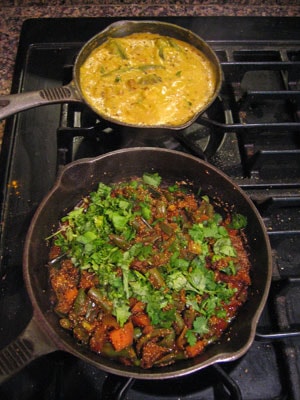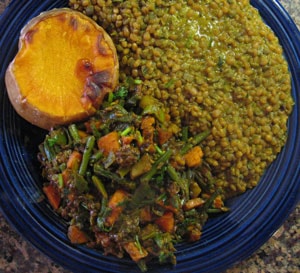Recipes
General Points

Okra-daikon kichadi, green beans, sweet potato and leeks in poppy seed-sweet paprika sauce
See my general guidelines for eating habits and food selection. See What Diet is Right for Me? for more specifics.
Unless otherwise indicated, all quantities are for single servings.

Baked butternut squash, wheat berry-French lentil and yogurt kichari, with mixed vegetables
Favor organically grown foods. Beware of pesticide residues in common fruits and vegetables. Never use GMO foods.
Minimize foods like peanut butter and chocolate that tend to block the fine channels of the body (Srotas). Also be cautious with vegetables from the nightshade family: potato, tomato, mature eggplant, and peppers. They are hard to digest and can be especially troublesome to those who have arthritis. The thin Asian eggplants, small globular Indian eggplants, and other small heirloom eggplants are not a problem.
Cook with cast iron or stainless steel. Properly seasoned and cared for, there is no need for Teflon. I keep a stainless steel frying pan just for making pancakes. I simply wipe it with a paper towel and it's clean and ready to be used again. If you have aluminum cookware, get rid of it. Aluminum is toxic to the nervous system.
Nuts should be soaked in water overnight, roasted or otherwise cooked. Almonds skins are mildly toxic and should be removed. Generally, they are easily rubbed off after soaking. Sometimes, almonds need to be blanched for a few in boiling water to free the skins.
Ghee
Milk
Yogurt
Main Courses
Desserts
Links
Best Ayurvedic Vegetarian Cookbook
Miriam Hospodar. Heaven's Banquet: Vegetarian Cooking for Lifelong Health the Ayurveda Way
Best Indian Vegetarian Cookbook
Vidhu Mittal. Pure and Simple: Handmade Vegetarian Indian Cuisine
Great Middle Eastern Cookbook
Yotam Ottolenghi and Sami Tamimi. Jerusalem: A Cookbook
It's neither Ayurvedic nor lacto-vegetarian, but it is a good read and introduction to the flavors of Middle Eastern cooking. It offers many great recipes that can be easily adapted to Ayurvedic principles.